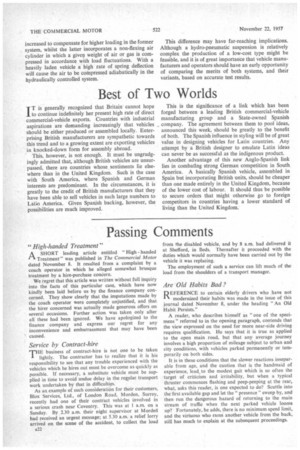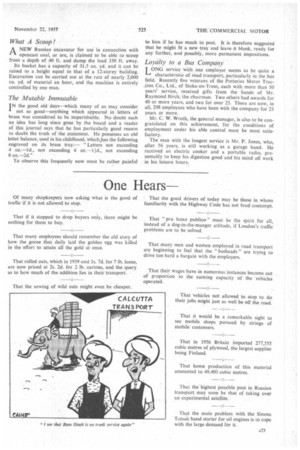Passing Comments
Page 24

Page 25

If you've noticed an error in this article please click here to report it so we can fix it.
"High-handed Treatment"
A SHORT leading article entitled "High handed r-k Treatment" was published in The Commercial Motor dated November 8. It resulted from a complaint by a coach operator in which he alleged somewhat brusque treatment by a hire-purchase concern.
We regret that this article was written without full inquiry into the facts of this particular case, which have now kindly been laid before us by the finance company concerned. They show clearly that the imputations made by the coach operator were completely unjustified, and that the hirer concerned was actually made generous offers on several occasions. Further action was taken only after all these had been ignored. We have apologized to the finance company and express our regret for any inconvenience and embarrassment that may have been caused.
Service by Contract-hire
THE business of contract-hire is not one to be taken lightly. The contractor has to realize that it is his responsibility to see that any trouble experienced with the vehicles which he hires out must be overcome as quickly as possible. If necessary, a substitute vehicle must be supplied in time to avoid undue delay in the regular transport work undertaken by that in difficulties.
As an example of such consideration for their customers, Blox Services, Ltd., of London Road, Morden, Surrey, recently had one of their contract vehicles involved in a serious crash near Coventry. This was at 1 a.m. on a Sunday. By 2.30 a.m. their night supervisor at Mordefi had received an urgent message; at 5.30 a.m, a relief lorry arrived on the scene of the accident, to collect the load
A22 from the disabled vehicle, and by 8 a.m had delivered it at Shefford, in Beds. Thereafter it proceeded with the duties which would normally have been carried out by the vehicle it was replacing.
The employment of such a service can lift much of the load from the shoulders of a transport manager.
Are Old Habits Bad ?
REFERENCE to certain elderly drivers who have not modernized their habits was made in the issue of this journal dated November 8, under the heading "An Old Habit Persists."
A reader, who describes himself as "one of the specimens" referred to in the opening paragraph, contends that the view expressed on the need for more near-side driving requires qualification. He says that it is true as applied to the open main road, but that any average journey involves a high proportion of mileage subject to urban and city conditions, with vehicles parked permanently or temporarily on both sides.
It is in these conditions that the slower reactions inseparable from age, and the caution that is the handmaid of experience, lead, to the modest gait which is so often the target of criticism and irritability, but when a typical thruster commences flashing and peep-peeping at the rear, what, asks this reader, is one expected to do? Scuttle into the first available gap and let the" presence" sweep by, and then run the dangerous hazard of returning to the main stream of traffic when the next parked vehicle looms up? Fortunately, he adds, there is no minimum speed limit, and the virtuoso who rams another vehicle from the back, still has much to explain at the subsequent proceedings.
What A Scoop!
A NEW Russian excavator for use in connection with opencast coal, or ore, is claimed to be able to scoop from a depth of 40 ft. and dump the load 330 ft. away. Its bucket has a capacity of 31.5 cu. yd. and it can be raised to a height equal to that of a 12-storey building. Excavation can be carried out at the rate of nearly 2,000 cu. yd. of material an hour, and the machine is entirely controlled by one man.
The Mutable Immutable
IN the good old ' days—which many of us may consider I not so good—anything which appeared in letters of brass was considered to be imperishable. No doubt such an idea has long since gone by the board and a reader of this journal says that he has particularly good reason to doubt the truth of the statement. He possesses an old letter balance, used in his childhood, whickhas the following engraved on its brass tray:— "Letters not exceeding 4 oz.-1d., not exceeding 6 oz.-11d., not exceeding 8 oz.-2d."
To observe this frequently now must be rather painful to him if he has much to post. It is therefore suggested that he might fit a new tray and leave it blank, ready for any further, and possibly, more permanent impositions.
Loyalty to a Bus Company
LONG service with one employer seems to be quite a characteristic of road transport, particularly in the bus field. Recently five veterans of the Potteries Motor Traction Co., Ltd., of Stoke-on-Trent, each with more than 50 years' service, received gifts from the hands of Mr. Raymond Birch. the chairman. Two others had awards for 40 or more years, and two for over 25. There are now, in all, 298 employees who have been with the company for 25 years or more.
Mr. C. W. Wroth, the general manager, is also to be congratulated on this achievement, for the conditions of employment under his able control must be most satisfactory. The man with the longest service is Mr. P. Jones, who, after 56 years, is still working as a garage hand. He received an electric cooker and a portable radio, presumably to keep his digestion good and his mind off work in his leisure hours.




























































































